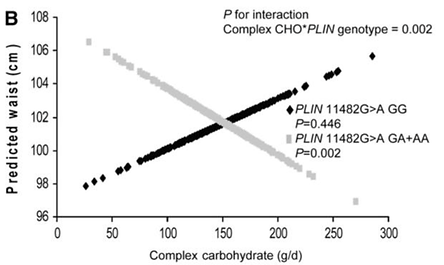Daily carbohydrates intake
Low carb/High carb diet
The PLIN1 gene encodes for perilipin, a protein that encircles the lipid storage droplet in the fat cells. By allowing access to the droplets, this protein regulates lipid storage and breakdown.
Carriers of a certain variation in PLIN1 show a unique response to carbohydrates intake, significantly impacting their BMI and waist circumference. Individuals with that variant show significantly greater weight loss when on high-carb diet. High-fat, low-carb diet on the other hand would have the exact opposite effect.
Get GeneInformed and find out your PLIN1 set-up and what’s your optimal carbohydrates intake.


Low-carbohydrate diets have been on the rise, claiming that low-carbohydrate, high-fat diets improve insulin resistance in obese patients. However, there is insufficient evidence to make general recommendations for or against the use of low-carbohydrate diets Moreover, advocates of this diet have not taken into account the relevant individual genetic characteristics.
Perilipins are the most abundant protein surrounding the lipid droplet in the adipocyte (fat cell). By coating the lipid droplets, perlipins protect them from breaking down by the enzyme lipase. These proteins actually the control access to the adipocyte triglyceride stores, and so they regulate lipid storage and lipolysis (fat breakdown).
Gene: PLIN1 (Perilipin 1)
Genomic coordinates (GRCh38): 15:89,664,364-89,679,416
The PLIN1 gene encodes for perilipin. A common variation in the code of this gene changes the affinity of the protein to the lipid droplet. Scientists have found that carriers of the minor allele (variant) were protected from increased adiposity in the context of high complex CHO intake, but at risk of increased adiposity when complex CHO intake was low. In other words, PLIN1 variant carriers enjoy a significantly lowered risk for obesity when complex carbohydrate intake was high. A low-carb/high-fat diet on the other hand is expected to increase risk of obesity among PLIN1 carriers.
Smith CE, Tucker KL, Yiannakouris N, et al. Perilipin polymorphism interacts with dietary carbohydrates to modulate anthropometric traits in hispanics of Caribbean origin. J Nutr. 2008;138(10):1852-8.
As this graph shows, individuals who carry at least one 'A' variant (whether GA or AA genotypes), will lower their waist circumference as they eat more complex carbohydrates instead of fat. On average, waist and hip circumferences were lower among PLIN carriers when complex carbohydrate intake was higher then 144 grams a day, which are at least 29% of total energy intake, on a daily diet of 2000 calories.
For GG carriers, which are the majority, high carbs consumption does lead to obesity, so high fat/low carb diet should be considered.
In addition to obesity, risk for diabetes was also lowered when carb consumption was high, and increased when carbs consumption was low. This finding was valid for carriers of two variants only ("AA" genotype). As seen below, most people show no significant association between the PLIN1 genetic set-up and risk for type II diabetes, as measured by assessment of Insulin Resistance values(HOMA-IR). However for AA individuals, Insulin Resistance values were highly responsive to diet composition. When dietary Saturated Fatty Acids (SFA) consumption was high relatively to carbohydrates (CHO) consumption, diabetes risk for AA individuals was much higher then normal. When SFA consumption was low relatively to carbs consumption, their risk could drop even below the normal risk in the population.
Corella D, Qi L, Tai ES, et al. Perilipin gene variation determines higher susceptibility to insulin resistance in Asian women when consuming a high-saturated fat, low-carbohydrate diet. Diabetes Care. 2006;29(6):1313-9.
For these findings, individuals with an AA genetic set-up are advised to follow a low-fat, high-carbohydrate diet. Low fat diet provides 20% to 30% of the daily energy need. Saturated Fatty Acids consumption should be reduced to less than 9% of total energy intake (180 calories, 20 grams of SFA), and the rest of the fat intake should include more Mono Unstaurated Fatty Acids (MUFA) and Poli-Unstaurated Fatty Acids (PUFA). Carbohydrates intake should come mainly from complex carbohydrates, found in whole grain wheat, oats, rice, and starchy vegetables like potatoes, beans and peas. Simple carbohydrates like table sugar or fructose promote insulin resistance and obesity.